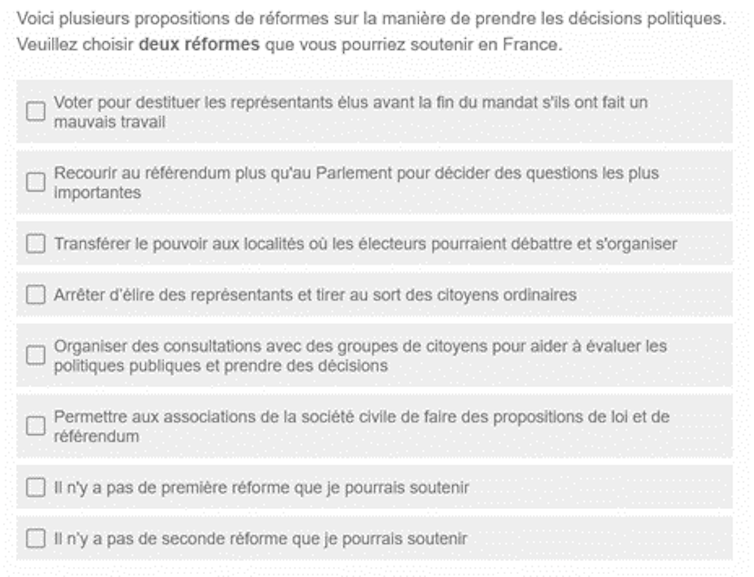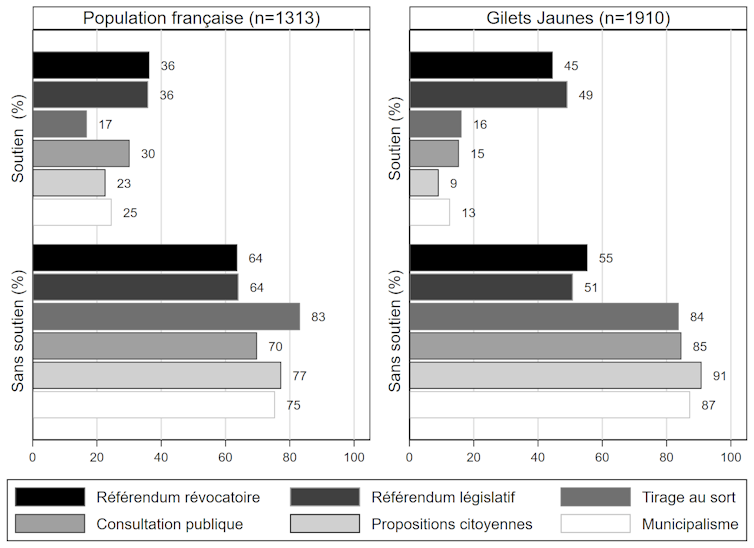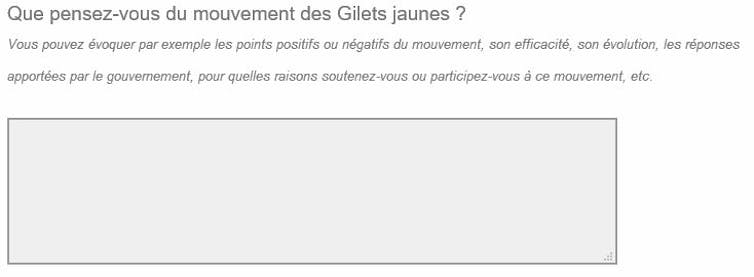Stéphanie Abrial is a researcher at the Pacte laboratory and a lecturer at Sciences Po Grenoble. Chloé Alexandre is a teacher at Sciences Po Grenoble and a doctoral student in the Pacte laboratory (@ChloeAlexxandre). Camille Bedock is a researcher at the Centre Emile Durkheim, CNRS Bordeaux. Frédéric Gonthier is Professor of Political Science at Sciences Po Grenoble and at the Pacte Laboratory (@FredGonthier). Tristan Guerra is an ATER at Sciences Po Grenoble and a doctoral student in the Pacte laboratory (@TristanGuerra_)
The "gilets jaunes" movement has baffled all political commentators, experts and academics alike. Rarely in recent years has a movement sparked so much debate about the profile of its supporters, their demands and expectations.
The question of the yellow vests' democratic preferences has given rise to very contrasting interpretations. Many relied on the centrality of the demand for a Citizens' Initiative Referendum and the strong rejection of elites to read a desire for permanent direct democracy, which would replace conventional forms of political representation.
Some have seen the movement's horizontal organization and citizens' assemblies as the seeds of a "libertarian municipalist" vision of politics based on local autonomy.
Others have preferred to go beyond these opposing readings, showing that despite their harsh criticism of elected representatives and political organizations, the yellow vests aren't really calling for the abolition of traditional political representation, but rather its refoundation around three principles: control of representatives, listening to citizens' demands and the geographical and statutory proximity of elected representatives.
Greater citizen control of elected officials
Extending these analyses, we chose to mobilize several data sources to fully grasp all facets of the gilets jaunes' relationship to democracy. First, we relied on two quantitative Internet surveys, one conducted among a sample of 1,910 gilets jaunes contacted via the movement's main Facebook groups, the other enabling comparison with a representative national sample of 1,313 French.es.
Both surveys asked participants whether they would support a recall referendum, a legislative referendum, the drawing of lots, citizens' consultations, citizens' initiative proposals and municipalism (Figure 1).

The first three innovations fall under the heading of direct democracy, since they involve citizens making decisions with which elected representatives must comply. The last three are more in line with a participatory democracy model, in which citizens make proposals to elected representatives, who retain legislative power.
Firstly, none of the six proposed innovations is supported by a majority of French people or yellow vests (Figure 2); this reflects a deep distrust of democratic institutions that is verified in other surveys.

Secondly, yellow vests are more likely to support democratic innovations that facilitate control of elected representatives and direct decision-making by citizens. Nearly half of them opt for recall referendums and legislative referendums, compared with 36% of the French. Conversely, they are less inclined to opt for participatory democracy-type reforms, whether they are more demanding in terms of resources mobilized by citizens, such as law proposals put forward by civil society (9%); or require collaboration with elected representatives, such as citizen consultations (15%).
The overall sociology of the movement sheds light on this result. As we have indicated elsewhere, the gilets jaunes constitute a population of precarious workers, at a distance from political institutions and parties, and therefore unlikely to assume the costs of participatory or deliberative democracy.
More sophisticated statistical modelling shows little difference according to gender, age, place of residence or number of events attended.
The yellow vests are therefore clearly more favorable than the rest of the French population to referendums - a democratic practice based on popular plebiscite. Further analysis indicates that they are even more so when they voted Le Pen, Dupont-Aignan or Cheminade in 2017.
Plural democratic aspirations
At first glance, support for citizen control mechanisms seems fairly uniform. masks the cohabitation of different democratic aspirations. democratic aspirations. This can be seen more clearly by analyzing the way how the yellow vests express their relationship with institutions institutions and political representatives.
To do this, we first carried out a textual analysis of an open-ended question in the online survey, which asked the gilets jaunes to render, in their own words, their perceptions of the movement (Figure 3). This initial work was then complemented by the analysis and coding of some thirty in-depth interviews conducted, in spring 2019, with yellow vests of varying profiles on their conceptions of the political system.

These analyses reveal two main types of discourse. The first focuses on the social difficulties that the gilets jaunes face in their daily lives, and for which political representatives are held responsible.
Partisan squabbles, dismissed as petty conflicts that distract political distracting political personnel from the real interests of a "suffering people". suffering", are castigated. Elected representatives, in particular Emmanuel Macron, who who crystallizes and personalizes a large number of criticisms, are seen as elites with exorbitant financial privileges, out of touch with reality.
As Thierry (45, aeronautics technician), who is joining his first movement with the Yellow Vests, points out:
"from an early age, you're taught that the chosen one is an idol. idol. No, the elected official has to go back to basics. He's a guy you pay, he's your employee".
It's in this sense that revocation is popular: it expresses the desire for elected representatives to be treated as workers at the service of the common good. This first discourse is rather carried by financially fragile yellow vests, with few qualifications, far removed from the world of politics and voting, and experiencing a social movement for the first time.
The second major speech refers more directly to democracy, rediscovered citizenship and republican principles such as solidarity, fraternity and social justice. Above all, it takes the form of a plea for more direct citizen participation. The RIC is thus promoted, and with it, all the institutional tools for including more citizens in political decision-making and listening to all political sensibilities.
Particularly sensitive to theVth Republic's lack of checks and balances, the yellow vests who articulate this discourse are also highly critical of elected officials, but they focus their criticism on the presidential figure and function rather than the person of Emmanuel Macron. Our analyses show that they are also more highly educated, more politicized - generally in left-wing organizations - and more strongly invested in the movement.
Two sides of the same appeal to popular sovereignty
The two types of discourse on democracy we've identified refer to cleavages internal to the Yellow Vests movement, which brings together activists with different levels of politicization and political values. But more fundamentally, they point towards the same desire to restore a democracy with which all say they are deeply dissatisfied, by putting popular sovereignty back at the center.
While some yellow vests, driven by a deep anti-elitist streak, want to subject elected officials to stronger constraints to re-establish a form of collective virtue, others prefer to be more involved in the practice of institutions. Both sides are therefore calling for the people, as agents of control or regulation of public decisions, to occupy a more important place in the French institutional edifice.
At a time when "season 2" of the movement is off to a rather timid start, these results suggest that yellow vests aspire to play a fuller, less ad hoc democratic role than in the voting booth or on the streets.
This analysis was originally published on The Conversation on October 27, 2021. It is part of the ANR collective, "Les gilets jaunes: approches pluridisciplinaires des mobilisations et politisations populaires", led by Magali Della Sudda.